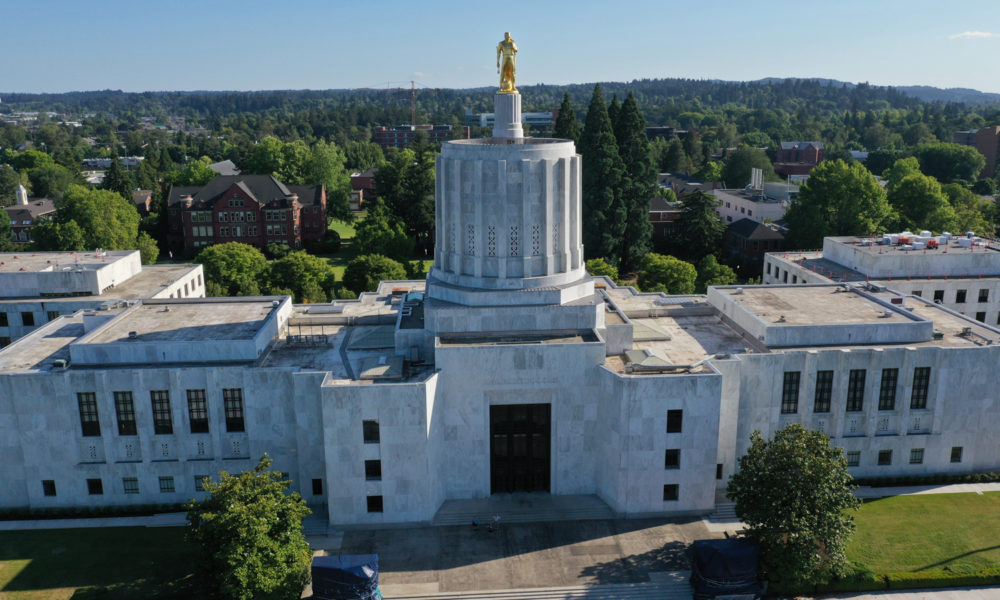If we didn’t know this already, 2020 showed us that climate change is not just about carbon dioxide emissions and melting polar ice caps. It is also about record-breaking, deadly wildfires across the West. And it’s about extreme heat waves that cause power blackouts and jeopardize the health of the elderly and other vulnerable people, during an already deadly pandemic. Climate change touches on so many parts of our lives, and the impacts of climate change have been especially devastating over the past year. But there are some signs of hope – like what’s happening in Oregon. This year, Oregon’s legislature has the opportunity to adopt a 100% clean energy target.
Here are some reasons why Oregon should take this important step toward addressing climate change:
1. Bragging rights
Right now, Oregon is lagging behind its neighbors, but with an ambitious climate target, they would join the vanguard. In 2018, California passed SB 100, which requires California electricity to be served by 100% zero carbon resources by 2045. In 2019, Washington state passed a law that requires 100% clean energy by 2045, and a carbon neutral electricity supply by 2030. Overall, according to a UCLA study, 13 states have passed clean energy targets.
2. Renewables are getting cheaper and cheaper
To quote my colleague John Rogers, “despite everything 2020 threw at them (and us), wind and solar look to be having record years.” Not only that, but analysts expect strong showings for new solar and wind installations over the next few years. And this is all because solar and wind prices are coming down and are more cost competitive than coal. A report from Lawrence Berkeley National Labs found that the price of utility scale solar dropped more than 70% between 2010 and 2019. The last coal plant in Oregon closed this past fall. Now is the time to invest heavily in clean energy resources.
3. More clean energy development can create good jobs
Note that the sentence above says can, not will. Clean energy jobs CAN BE good jobs, but it will take work on the part of policymakers. Policymakers need to ensure that the jobs created pay well, offer good benefits and training opportunities, and are targeted toward communities suffering from unemployment and underemployment. Given that the Biden administration is prioritizing clean energy jobs and other green jobs in its climate and energy plan, now is a great time for states to follow suit. Clean energy legislation must include local hiring requirements, job training and placement for underrepresented groups, a living wage for all clean energy jobs, good benefits for all clean energy jobs, and opportunities to unionize if workers choose.
4. The benefits go far beyond climate change alone
Let’s be clear: if a climate solution is not addressing environmental injustice, it’s not a solution. Frontline communities bear burdens now that wealthier and more protected communities will face down the line. So, aside from the fact that it’s the right thing to do ethically, it benefits everyone to focus solutions on the groups most impacted right now.
To ensure a truly equitable bill is passed, Oregon lawmakers need to listen to the voices of frontline and impacted communities like those being amplified by Oregon Clean Energy Opportunity Campaign. The campaign has prioritized energy affordability and making sure that low-income communities have the resources they need to stay safe and healthy amid a global pandemic, extreme heat, and record-breaking wildfire seasons. The campaign has also supported a housing bill that will help low-income families weatherize their homes – reducing energy bills and making their homes more comfortable during extreme weather. In addition, there is a proposal to address energy affordability by creating a new reduced energy rate for low-income families that are already overburdened by high unemployment and health concerns during the pandemic. Finally, while pursuing 100% clean energy, Oregon lawmakers can prioritize clean energy from sources that benefit communities, such as community solar and local solar plus storage projects.
Through a comprehensive package of legislation, Oregon has the chance to reduce global warming emissions, make electricity and heat more affordable for low-income households, and help ensure that Oregonians’ homes are safe even during extreme weather events. We urge the Oregon legislature to take action to mitigate climate change and protect vulnerable Oregonians.

